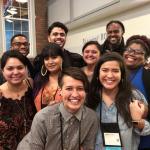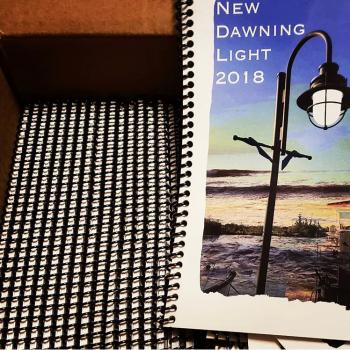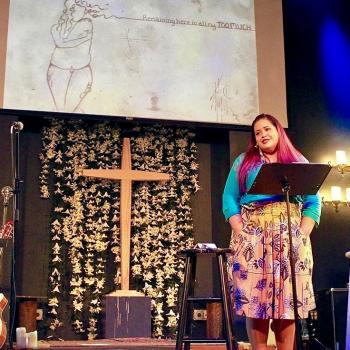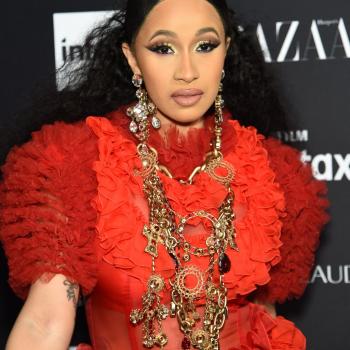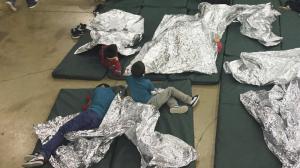
There is this cyclical injustice where trauma is inflicted, the traumatized lay their wounds bare attempting to awaken the abuser to what they have done, the abuser momentarily awakens but subsequently forgets, and trauma is inflicted once more. Again and again… like clockwork. The collective pain of the brown community cannot and should not ever serve as a catalyst for white enlightenment.
My value as a woman of color is not determined by my ability to sanitize my experiences for a white audience.
I know these things to be true yet I have to work regularly not to internalize the narrative that says that pain is necessary for my very identity and worth to be defined. That narrative has eclipsed my ability to find a voice today.
How do I expel the bodily pain of witnessing the caging of children of color in a way that motivates people to action without feeling as though I am offering my very self up for consumption?
So, instead, I offer this up to refugees, to my fellow immigrants, to those that were and are children of color. This is to say that we acknowledge and understand one another- even when the rest of society can’t or won’t. Speaking directly to you or not, my words are for your edification and liberation. Everyone else is secondary.
The other side of my struggle is the care I am taking with locating myself in this story. It is human nature to want to protect your own and when you see yourself in others, your personalization of the story and identification with it propels you into taking redemptive action. This is why society can look at someone such as a rape survivor and say “she matters because she could’ve been my daughter, my mother, or my sister…”. The survivor must be something more than merely human for her pain to be legitimized in our hearts.
However, the trauma these black and brown children are being subjected to should need no legitimizing narrative. Their pain matters because they matter. Full stop. I don’t need to see myself in the experience to feel compelled to protect them. Nor should you. Still, I see my past in these babies. Therefore, I offer up my experience, not to legitimize theirs but to honor and stand alongside.
I know what trauma of this sort does to the spirit, to the body, and to the mind. Some of these children will remember every excruciating detail of being ripped away from their parents. Some are so young that, on the surface, it will be as if it never happened. Nonetheless, the damage will be done.
Eventually, their bodies will say, “it’s time to deal with this trauma,” and these children will have no choice but to comply. If they don’t—a litany of addictive or other maladaptive behaviors will follow.
Every child who sits in a cage, a tent, or a shelter who are mandated untouchable by those who would reach out and hold them, but can’t; all of them will be traumatized. Some irreparably.
Before being brought to the U.S. in 1988, I spent the first few years of my life in a Venezuelan orphanage. I have no memories of it save what was told to me by my older brother and adoptive mother. As a toddler I did not have access to the few available cribs or beds. I slept and played on the orphanage floor. No one held me, comforted me, loved me. It is impossible for me to look at photos of children sleeping on the floors of cages and not see myself.
When I came to North America I received language to describe what this had done to me. I was diagnosed with depression, an attachment disorder, and post-traumatic stress disorder, the latter being so severe that it required months of hospitalization. All this for a time I can’t even remember. For my older brother, it manifested as violence and anger. For my younger sister, the unhealthy and indiscriminate need to connect with others. For me, it was the inability to connect. I trusted no one. I couldn’t cry or be vulnerable. I walked around with a constant, burning anger in my gut. I anticipated abandonment at every turn. Trauma manifests differently in each of us but this is what isolation and a lack of bonding does to a child.
THIS is the future we are preparing these children for. We’re breaking them from the inside.
Apologists will try and liken this to the U.S. foster care system. That is neither wholly accurate nor effective. Caging children in abandoned box stores is NOT, by any stretch of the imagination, the same as the foster care system. Regardless, no person with firsthand knowledge of the system would hold it up as justification. Being a ward of the state inflicts its own wounds.
That system that many Americans believe is benign, if they even notice it at all? Yes, I know that system intimately. I spent most of my childhood in it. I have experienced it all, from lockdown facilities, to foster homes, to respite care, to group homes that house dozens of children. What we are seeing is more severe than what I endured but the parallels are undeniable. When we are disproportionately represented in the foster care system, rampant racial disparities occur throughout our continuum of care, and it’s our borders, families, and communities that bare the brunt of government abuse- it is all representative of the same issue. The repeated dehumanization of children of color.
I will not expel a great deal of energy combatting the false narrative that this is the inevitable and justifiable result of having criminals for parents. No, actually, their parents aren’t all criminals seeking to, as the sitting president has said, “infest” our country but that’s irrelevant here. Sidenote: using language that compares us to vermin and insects is racist but that’s another article. Is there any act YOU could commit that was so egregious you would accept the punishment falling on your child? The misdemeanor act of illegally crossing a border? The LEGAL act of presenting yourself at a border for asylum? Is there any act you could commit that would justify the caging of your child? Any act where society has deemed that morally acceptable?
After years in the system, trauma is carved into my bones. I battle depression and suicidal ideation, my whole body tenses if someone enters the room unexpectedly, I am overcome with anxiety when someone shouts my name. Not all—but much of this is a direct result of experiences that mirror those these children are experiencing right now. I am trying but I don’t know if I will ever experience feeling “whole” or accepting that I am “safe.” I will likely spend the rest of my life carrying all of this in my body. It informs every relationship. Every experience.
We [people of color] carry generations of trauma. I would question if the U.S. is ready to carry the burden of these consequences if I did not know this country’s history. Enslaved children, Native victims of boarding schools, Japanese babies in concentration camps. Inflicting trauma is written into the DNA of a country that refuses to see us as human.

